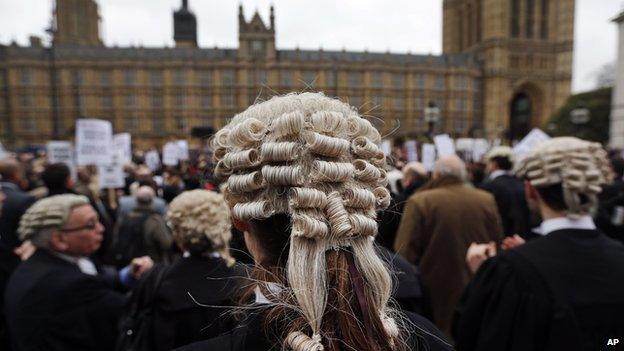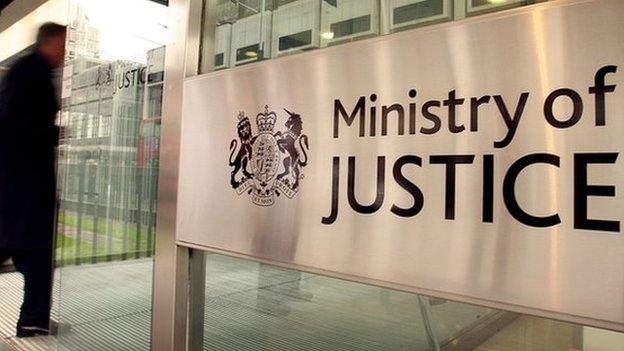Operation Cotton: Court of Appeal ruling explained
- Published
- comments

Barristers have held protests over legal aid cuts
The Court of Appeal has overturned a decision to halt a fraud trial because of a lack of specialist criminal barristers prepared to take on the work.
I've covered the initial row over the prosecution - known as "Operation Cotton" - in an earlier blog.
The stakes could not have been higher going into the Court of Appeal. Had Sir Brian Leveson and the two other senior judges hearing the case upheld the stay of the prosecution, it would have amounted to a hammer blow to Justice Secretary Chris Grayling's attempts to slash some parts of the legal aid bill.
Perhaps more importantly than the finances of the public purse, it could have brought the wheels of justice in complex and very high-cost criminal trials to a grinding halt.
Emergency measures
So why did the Court of Appeal overrule Judge Anthony Leonard QC?
His judgement was that the defendants could not find any specialist self-employed barristers or advocates who were employed by a government agency called the Public Defender Service.
Barristers had refused to sign new contracts for Very High Cost Cases after a 30% cut in fees - and the PDS, a government agency, was said to have nobody suitable available.
During the appeal, the Ministry of Justice said that it had implemented emergency measures to recruit more public defenders.
If that recruitment drive is successful, then ministers hope they will have sufficient barristers on the books to undertake work in cases like Operation Cotton - and that the costs will be lower than legal aid payments to traditional self-employed advocates.
In the judgement, external, the Court of Appeal says that it is "undeniably the responsibility" of the Lord Chancellor Chris Grayling to sort out how the men in Operation Cotton are going to be represented.
So, quite simply, the Court said that while there may come a time when the case could not go ahead because of a lack of representation, that time had not yet come.
Sir Brian Leveson said: "On our analysis there was a sufficient prospect of a sufficient number of PDS advocates who were then available who would enable a trial to proceed in January 2015. That pool included a sufficient number of advocates of the rank of QC."
So the ball is now firmly in the Ministry of Justice's court.
But even if Operation Cotton does finally get to trial, the judgement has not made the bigger problem go away. There needs to be some kind of new long-term deal between barristers and the government (that is assuming that the government isn't going to continue to expand the PDS).
And that's why Sir Brian Leveson has inserted a carefully worded observation at the end of the judgement.
He said that the criminal justice system needed the best possible advocates to ensure trials were fair, efficient and avoided potential miscarriages of justice.
"We have no doubt that it is critical that there remains a thriving cadre of advocates capable of undertaking all types of publicly-funded work."
Perhaps, most importantly, he notes that some of those advocates will be the judges of the future - the subtext being that if the government wants good decisions in the courts, then it needs to ensure the best people see a future in the business.
"In those circumstances, it is of fundamental importance that the Ministry of Justice, led by the Lord Chancellor, and the professions continue to try to resolve the impasse that presently stands in the way of the delivery of justice in the most complex of cases.
"The maintenance of a criminal justice system of which we can be proud depends on a sensible resolution."
- Published21 May 2014
